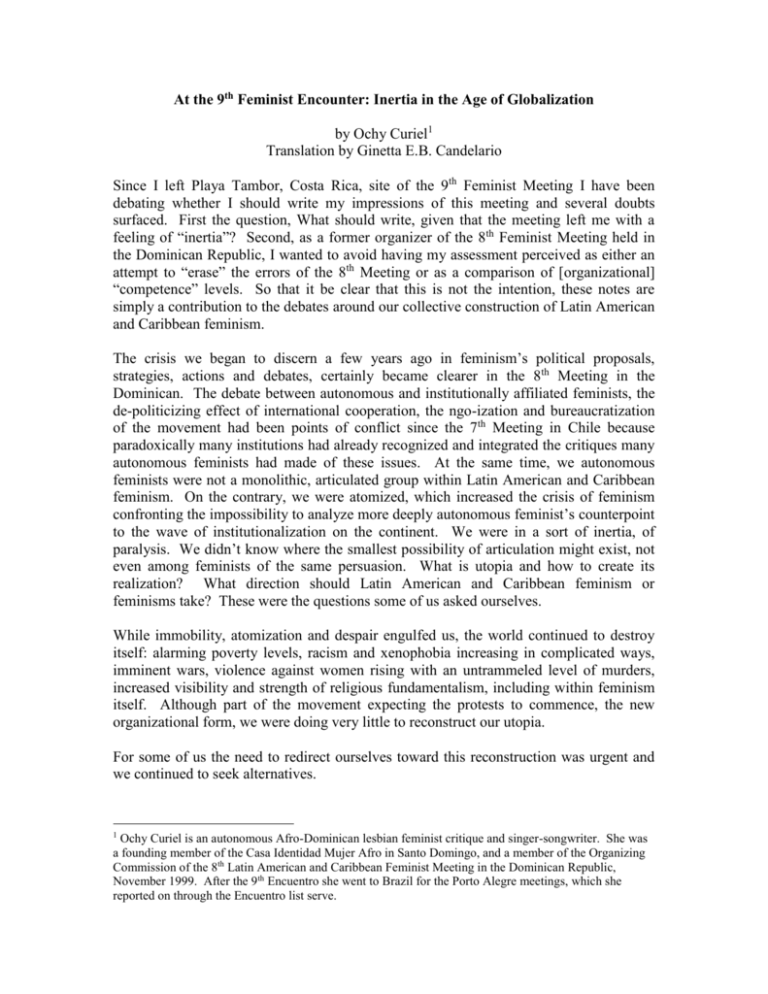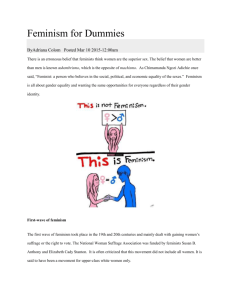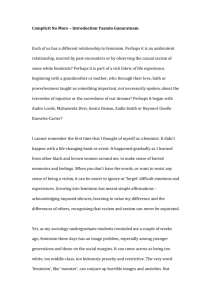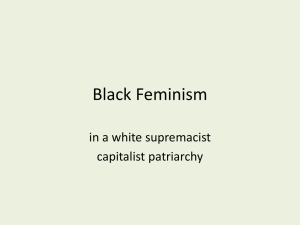At the 9th Feminist Encounter: Inertia in the Age of Globalization
advertisement

At the 9th Feminist Encounter: Inertia in the Age of Globalization by Ochy Curiel1 Translation by Ginetta E.B. Candelario Since I left Playa Tambor, Costa Rica, site of the 9th Feminist Meeting I have been debating whether I should write my impressions of this meeting and several doubts surfaced. First the question, What should write, given that the meeting left me with a feeling of “inertia”? Second, as a former organizer of the 8th Feminist Meeting held in the Dominican Republic, I wanted to avoid having my assessment perceived as either an attempt to “erase” the errors of the 8th Meeting or as a comparison of [organizational] “competence” levels. So that it be clear that this is not the intention, these notes are simply a contribution to the debates around our collective construction of Latin American and Caribbean feminism. The crisis we began to discern a few years ago in feminism’s political proposals, strategies, actions and debates, certainly became clearer in the 8th Meeting in the Dominican. The debate between autonomous and institutionally affiliated feminists, the de-politicizing effect of international cooperation, the ngo-ization and bureaucratization of the movement had been points of conflict since the 7th Meeting in Chile because paradoxically many institutions had already recognized and integrated the critiques many autonomous feminists had made of these issues. At the same time, we autonomous feminists were not a monolithic, articulated group within Latin American and Caribbean feminism. On the contrary, we were atomized, which increased the crisis of feminism confronting the impossibility to analyze more deeply autonomous feminist’s counterpoint to the wave of institutionalization on the continent. We were in a sort of inertia, of paralysis. We didn’t know where the smallest possibility of articulation might exist, not even among feminists of the same persuasion. What is utopia and how to create its realization? What direction should Latin American and Caribbean feminism or feminisms take? These were the questions some of us asked ourselves. While immobility, atomization and despair engulfed us, the world continued to destroy itself: alarming poverty levels, racism and xenophobia increasing in complicated ways, imminent wars, violence against women rising with an untrammeled level of murders, increased visibility and strength of religious fundamentalism, including within feminism itself. Although part of the movement expecting the protests to commence, the new organizational form, we were doing very little to reconstruct our utopia. For some of us the need to redirect ourselves toward this reconstruction was urgent and we continued to seek alternatives. 1 Ochy Curiel is an autonomous Afro-Dominican lesbian feminist critique and singer-songwriter. She was a founding member of the Casa Identidad Mujer Afro in Santo Domingo, and a member of the Organizing Commission of the 8th Latin American and Caribbean Feminist Meeting in the Dominican Republic, November 1999. After the 9th Encuentro she went to Brazil for the Porto Alegre meetings, which she reported on through the Encuentro list serve. Then the 9th Latin American and Caribbean Feminists Meeting is organized around a theme that indubitably is the order of the day: Globalization and Neo-liberalism, which feminism obviously had an urgent need to confront collectively. That is why I always thought that “Active Resistance to Neo-liberal Globalization”, the theme selected for the 9th Feminist Meeting, was an ideal theme because of the moment we are living worldwide and because it could allow for feminist articulations on the continent. My hope that many feminists would begin to make an important leap forward was renewed: we could begin to develop a more radical and material vision-action. Up to now the feminism that rules the region and that has been legitimated has been on the margins of a social, economic, political and cultural reality that affects a great many feminists and women who are forced to confront the effects of neo-liberalism and its economic and cultural “worldization”. These women are even made invisible by a middle class and bourgeois feminist movement. That was where my hope lay. As I saw it, perhaps naively, we could begin to take that leap in the face of social movements’ crises and the lack of political perspectives, cohesive collective projects and the incipient birth of an unevenly successful worldwide anti-globalization movement unfortunately led by men and which appears to be one of the few visible options for the subversion of and challenge to neo-liberalism. I personally believed that feminism had a great deal to contribute. The themes proposed by the Organizing Commission also seemed appropriate. These were: Feminist Expressions as Socio-Political Subjects of Globalization; Patriarchy and Capitalism’s Transnationalization; The State, Civil Society, the International Monetary System and International Political Organizations; Our World Corpus: Politics, Resistance and Alternatives to Globalization. Despite the frustration and exhaustion being the 8th Meeting’s organizer left me with, I never stopped doing feminism, I never reneged. On the contrary, I continued to seek out autonomous, crazy and bewitched feminist spaces so as to not falter along the way, because without a doubt the Dominican Meeting taught me a great deal and was very satisfying. One of the things I learned was the need to consolidate an active and rebellious feminist movement, to expand its thinking to a consideration of the political practices of the women most affected by neo-liberal politics because of their class, race, or sexual identity. That’s why I decided three years ago that I would attend the next one with concrete proposals and with the desire to affect something. I understood that it was possible to contribute to that leap forward. Luckily I was echoed by some feminist compañeras and we went to the Meeting to present three fundamental proposals. The first and for us most important one was the expansion of Cora G., a proposal we began to develop in Guatemala: Julio Falquet, Melissa Cardoza, Zoila Madrid, Mercedes Cañas and I. A sort of articulation, nexus or whatever autonomous feminists want to call it, that would allow us to create a feminism that confronted neo-liberal politics, the United Nations and the International Monetary Fund, was subversive and present in women’s or social movements’ actions, reflections and debates, and would begin to develop an alternative political force in the region’s feminism. On the other hand, since we understood that racism was assuming unprecedented, astounding, and difficult characteristics in the context of neo-liberalism and globalization, and that it was a fundamental effect of neo-liberal politics, we felt it important to analyze it and determine what feminism’s posture should be. That is why we prepared a proposal for a panel with Wendy Mateo and Marilyn Berroa, three members of Afro Women’s Identity House, in which we presented an analysis of racism focused on the political strategies we have and which we should undertake. Indigenous, European, Black and other Latin American feminists participated. As a feminist artist, another of my proposals was a lesbian feminist concert that would question systematically obligatory heterosexuality, that would make visible lesbians and black women, that would present art as one way of doing politics and that was necessary to take up again. To that end we prepared the Poésica concert with the Honduran writer residing in Mexico, Melissa Cardosa. From that same lesbian-feminist perspective we signed up Julio Falquet, Melissa Cardosa and me to the circulation to the 2003 Macorina Lesbian Feminist Agenda and a workshop on lesbian art. I note all this because many of us intended to go to the 9th Meeting to intervene politically from an autonomous lesbian feminist perspective, with concrete proposals because we understood that the theme and the moment lent itself to that given the absence, lacuna and inertia feminism was undergoing. But our hope began to fade before the Meeting even began. The problem began when months before the Meeting the list serve went up to circulate information, but above all to open a space for debate as a warm up for the Meeting. As far as I know, apart from the papers the Organizing Commission posted on the Web page, only two of us posted articles for debate: Julio Falquet, who analyzed the U.N. and transnational organizations, and me, on women’s anti-racist politics in the context of globalization. There was no reaction, other than some compañeras who said they liked it. It generated no debate. Yet when many feminists began to propose workshops on spiritualism, Buddhism, massage, etc., dozens of reactions issued forth, fascinated by the possibilities these spaces provided. The list serve became tiresome and insufferable due to the emails filled with statements like “It’s great that this workshop will be held. I also do X spiritual practice.” The list serve began to turn in that direction, in addition to the Organizing Commission’s informational postings. My doubts about the 9th Feminist Meeting began then, frightened, as I was by the wave of spiritualism that a great many feminists were supporting and practicing. From that moment on, my expectations changed, and were confirmed during the days of the meeting. Spirituality: Depoliticizing Feminism “Everything is sacred”, “Our strength is in our uterus”, “We women should have compassion for ourselves” – these were the phrases that marked the opening event and which were repeated throughout the meeting. Many of us were extremely affected by this essentialist spiritualism which reproduced Judeo-Christian patterns that differed only in change Goddess for God, Father for Mother, but which reproduced the same codes, the same symbols. Many of us were terrified. We were even more worried by the fact that the spirituality workshops were the most well attended, an indication of the number of feminists who are committing themselves to those individualistic and de-politicized practices. Feminism has struggled for decades against fundamentalisms, against patriarchal religions, and it has wanted to legitimate spirituality from women’s perspectives, reconsidering and reconfiguring witches, shamans, Cimarrons, indigenous women. The proposal at the 9th Meeting was the exact opposite: a reproduction of the “New Age” fashion and/or of an inverted Christianity. Some of us challenged this posture, proposing laity as a way to direct our attention to a place that won’t immobilize us individually and collectively, that won’t make us complacent in the face of patriarchy’s attacks, and that if takes up spiritual elements, it do so as a subversion of a traditional vision imposed for centuries. The Sacred Cows Come Again in a Hierarchical Methodology: One of the contributions I personally believe the 8th Feminist Meeting in the Dominican Republic made was a methodology that avoided epistemic hierarchies and central panels so that an exchange of experiences and recognition of histories would occur. The Costa Rica meeting took a step back in this regard. Instead of removing the impediments to that process in the Dominican Republic, it promoted hierarchies once again. Once again we found ourselves with the same feminists in the central panels, which occurred at the best times and in the best spaces of the Meeting. Most of the compañeras invited repeated their usual discourse, which many of us have been familiar with for several years. It is not a coincidence that they are the ones who have the economic means and the space to write and to be in the tribunals legitimated by the patriarchy. As a result, many of us are tired of listening to their same old stances, many of which are haughtily sustained, and of listening to those who believe they own feminism’s truths. Of course, these panels were affected with the Otherness syndrome: three black women and a young woman participate, though it is important to note that there were no indigenous participants. To my mind, however, the worst thing was that the papers generated very little debate. Nor did we react during the plenary to some of the interesting positions that were taken. In that sense I don’t believe the themes proposed in the meeting were considered deeply, often they weren’t even touched upon. As a result, a sustained and orderly debate of the meeting’s central theme was not made possible. The question is why? What that level of inertia? Questions like “What is the feminist proposition vis a viz neo-liberalism that will change the anti-globalization movement?” are still unclear to me. The Lack of a Discussion on Racism and the Meeting’s Own Racism: I was especially struck by the absence of indigenous feminists at a Meeting held in Central America, a region marked by a history of indigenous struggle recognized by all, in which many indigenous women have been doing feminism from their perspectives, cultures and realities. There were just a few indigenous sisters at the 9th Feminist Meeting. This fact illustrates once again the racism of our feminism. The question is, Why weren’t they there? Who is responsible for this continuing to happen? Similarly I asked myself, Where are the black Costa Rican women who have made themselves visible and done the important work of confronting racism in this country over several years? Why such a low participation of francophone Caribbean women. Why weren’t there more feminists from the English and other Caribbeans? If we don’t undertake a serious analysis of this problem, I believe we are creating a movement that becomes increasingly racist even as rhetoric of diversity allow us to “mea culpa” ourselves. It is a grave problem that illustrates the discordance between our ethical and political principles. Racism practically glowed in absentia had not some of us (black and indigenous women) signed up some workshops, with the exception of a workshop organized co-organized by a black woman and a white woman. It was not taken up by any of the central panels, although right now racism is one of the most devastating effects of globalization and neoliberalism. This proves how it continues to be assumed that we black women and indigenous women are the only ones who should speak of this issue, when racism is a structural problem, a system, an ideology that all feminists should analyze and combat. Despite this, an important step forward in this area was that the organizers made an effort to guarantee simultaneous translations of the plenary sessions into French, English and Portuguese, which deserves special recognition, particularly considering the high costs this implied. The problem of translating in the workshops remains, as does the incorporation of other languages so that more women, especially indigenous women, can actively participate and we can begin to break with the continued legitimating of the colonizers’ languages. Art: The Meetings’ Floral Centerpiece Artistic activities were once again the leisurely part of the meeting, disarticulated from the meeting’s debates. Once again art appears as the moment of creativity and respite after the strains of the day’s work. A sort of centerpiece that adorns the evenings. How long will this go on? We still do not accept the importance of art as a means of doing politics in and of itself, and this is a grave error, as much on the part of the artists as of the non-artists. Despite that the artistic presentations were quite good: Grupo Claroscurro from Costa Rica, The Vagina Monologues presented by two Costarican actors, Guadalupe Urbina, Matagalpa Theatre Group, the Poésica Concert Melissa Cardoza and I wrote, among others. There were some serious problems I believe I should mention. Since the times available for the use of the space for artistic events were limited because it had to be turned over afterwards for the hotel’s presentations -- which were sexist, racist and lesbophobic -many of us artists were affected by this problem. The Poésica concert and the Matagalpa Theatre Group presentation were concrete examples of this. We (in Poésica) had prepared an approximately two-hour-long concert and had sent our technical requirements information several months ahead. Then these requirements were reiterated at the meeting itself to the Organizing Commission member responsible for the artistic events. At concert time, even the minimum requirements weren’t met, one of the requested microphones was missing and our show was opened. We were delayed while the missing microphone was installed. After it was installed, it didn’t work. Finally, we began the concert and in the midst of our songs and before the audience, we were informed that we had to wrap up, although we had not been on for even one hour. That was why the sisters from Matagalpa were unable to present after us. One of the women responsible for artistic talent then blamed us for the postponement of Matagalpa’s presentation. We greatly regret this outcome, as it made manifest the serious problem of competence and power among us: while the Costa Rican groups and/or artists presented for three hours with the best technical resources, even repeating two concerts during the Meeting, it was precisely those of us who were not from Costa Rica who were the most affected by time constraints, technical conditions and lack of space. What a coincidence! Once Again the Hotel Mistake: I never understood why the same mistake of using tourist hotels for the 9th Meeting was made given that the 8th Meeting’s Organizing Commission and participating feminists had already realized after the Dominican experience that it had been a serious political problem. Once again we found ourselves sharing space with tourists, without our own spaces. We found ourselves once again facing a multinational hotel chain system with sexist, patriarchal, discriminatory and racist rules and norms, and in which the exploitation of folks from the region resembles modern slavery. And worse still, it was a hotel we learned was built on mangroves destroyed despite the active protests of the locals, who obviously lost that fight. All this in the context of a Meeting that set Active Resistance to Globalization and neo-liberalism as its organizing theme was sadly paradoxical. Once again beach areas, which propagate feminist tourism and dispersion, taken together with a suffocating heat that didn’t even let us think. In this hotel we could not even organize our own party; instead we were ruled by the hotel’s schedule and on the few nights we wanted to dance we were forced to share the space with tourists and to bear the disc jockey’s sexist interventions. Worse still was the Organizing Commission totally complacent attitude toward hotel management when some of us rebelled against those norms. A concrete example was when many feminists were told to get dressed and were forbidden to enter certain areas of the hotel in our bathing suits. Many refused and rather than support the feminists, members of the Organizing Commission chastised them and asked them to please put on their clothes. Patriarchy once again exercises control over our bodies and many of us were frightened by the thought of breaking free. It is urgent that these errors, which illustrate our feminism’s incoherence, not be repeated in Brazil. There are alternatives that we must seek together. An Almost Totally Clandestine Meeting: I never understood why there was no press in the Meeting, other than the feminist media that traditionally is present, such as International Feminist Radio. Why wasn’t the possibility of making an impact through other means of radio, written, and television media in Costa Rica allowed? Why wasn’t there a public protest, since these are two of the politically important elements of feminist visibility in the countries where the meetings are held? I felt totally hidden away. Is it possible that we are already co-opted? Can it be the lesbophobia among us? These are questions I expect we can answer together. It is regrettable, because if there is something rich about the feminist meetings it is the visibility they provide for a Latin American and Caribbean movement in the country in which it takes place. They are set a precedent that opens others spaces at the national level. And the lesbians? Another of the frustrating sensations was the low-key presence of lesbian feminists, whether in the workshops, panels, leisure areas, and the day-to-day, particularly since most of the presenters and many of the Organizing Commission members were lesbians. I was very surprised by this situation in Costa Rica, where there has been important lesbian feminist organizing and where there are many lesbian feminists. This is yet another indicator of the immobilization, atomization and lack of vision among lesbian feminists in the face of neo-liberalism. This confirms my critique and that of many others that what we have on our continent is lesbian feminism with a barely cohesive vision of the social, political, and cultural reality and that demand citizenship rights and diversity. It is lesbianism lived solely in the private sphere and barely questioning of heterosexuality as a system. I believe we should pay serious attention to this. The Young Women: From a discourse of victimization to a more purposeful one Among the experiences that filled me with hope was the greater expressive and numeric presence of young women at the meeting. I believe they had a well-articulated proposal, more transgressive not simply in political terms, but in their way of expressing it with their bodies. When I saw young feminists with their breasts exposed, flinging their bras, I was filled with great hope that hot all was lost, especially when I listened and heard such subversion and transgression in their proposals. It was not long about how the adult women did not give them their space. It was instead a discourse based on a need to reassume transgressions that many of the adult women had lost. CORA.G. A proposal in action: Although the workshop we had proposed did not appear in the program, we worked daily to motivate feminists to participate in the Cora.G. workshop. We succeeded in getting about 50 feminists to attend and to move forward this proposal as a way of articulating autonomous efforts, concerns, political perspectives, theories and creativities from different countries. We’ve already begun to work: we have developed strategies for the World Social Forum in Porto Alegre, we began to develop our ethical-political foundations, we have our list serve and we have defined our plans. We will soon be distributing the document that founds our lesbian and feminist action and the other activities many of us have planned for the future, all in order to break free of our Latin American and Caribbean feminism’s inertia. Finally, a sincere thank you: I am grateful to the 9th Meeting’s Organizing Commission for all the work they undertook during three years, the high levels of organization, the political vision in defining the general theme and the sub-themes. I believe we are all responsible for not having gotten more out of it. I only hope that from now until Brazil, where the 10 th Meeting will be held, we can continue to debate, define political strategies from a more critical, more radical, more transgressive and less inert feminism facing the grave world wide situation we find ourselves in. January 17, 2003








